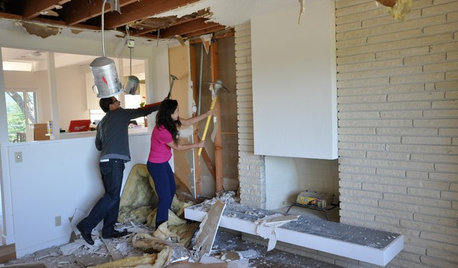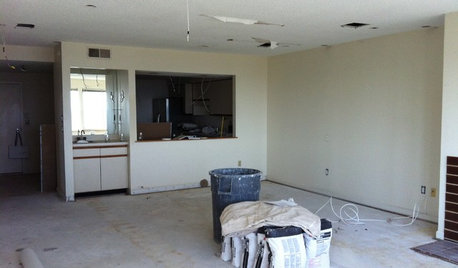Help with Insurance Wording/Down Payment in Contract for Remodeling
Kevin Doherty
last year
Featured Answer
Sort by:Oldest
Comments (20)
Related Discussions
What is essential to include in remodel contracts?
Comments (23)The first thing to determine regarding liens is whether your state allows a sub-contractor lien to be perfected by a court if the Owner paid the General Contractor for the work or materials before the lien was filed. In other words, find out if your state allows an Owner to be forced to pay twice for the same work or materials. Some do and some don't. If your state allows proof of full payment to the GC as a defense, then you only need to be concerned with detailed billing and payment procedures and those should be described in the contract. Using a Cost of the Work contract helps a great deal in that regard. Second, you need to decide which protection is preferred: a Performance Bond or Lien Wavier/Releases. Both increase the cost of the project for the Owner since the former requires the GC to buy a bond, the cost of which he will pass along to the Owner, and the latter requires the GC to finance the project, the cost of which he will pass along. There is also the issue of the credit worthiness of the GC which can be a problem with small contractors and very low bidders. If you decide on lien waiver/releases, you need to determine if your state requires them to be on state supplied forms. If so, that form should be included in the contract. If, in order to lower the cost of the project, you allow the lien wavier/releases to be conditional (they are made before an owner payment is made and take effect after it has been made) then you might consider using the joint check approach but only if you become worried about the GC's financial situation or honesty. In any event, the generic wording suggested by Bob should be revised to reflect the approach and procedures you decide to use....See MoreAm I over complicating a remodel contract?
Comments (5)I understand your dilemma as I drafted and negotiated contracts. But one has to use a rule of reason when dealing with smaller entitles. You want to protect yourself if things go south without scaring the other party away by presenting them with a document that would be used to construct the Hoover Dam :--) My goal was to make sure that any third party reading the contract would have a clear understanding of what the parties agreed to - therefore as posted you want to completely spell out the scope of the work and the materials to be used. In my remodeling contract, this was achieved because my designer had provided very plans with specifications. If things need to be decided down the road - i.e. exact color of stain or paint - that was specified and all the parties initialed the approved door (for example). I feel confident that if something wasn't done, a third party coming in could look at the plans and the contract and have a reasonable idea of what the intent of the parties was. I also threw in the language necessary to protect myself such as requiring that I be named as additional insured; I was provided with copies of insurance (liability and workman's comp) and a copy of valid contractor's licenses including plumber and electrical subcontractor licenses. I had a clause about release of mechanics liens and of course a payment schedule. I also added the bare minimum of boilerplate regarding indemnity etc. I know that when this has been discussed in terms of contracts, there has been advice that specific guidelines be addressed - i.e. that tile be installed in accordance with specific industry guidelines. I didn't have this kind of language because I was relying on the expertise of my designer who had worked with this GC on multiple projects and I had also taken a look at projects he had completed to get a sense of the quality of his work. Perhaps I was taking a chance but again, I was cognizant of what would be achieved by that. Knock on wood things seem to be going along well as everything looks great and I am relying on my designer who is really acting as my project manager. I suspect she is much more likely than I am to spot shoddy work unless it is really egregious since construction is completely out of my field of expertise. In retrospect the only issue so far - knock on wood - is how long it is taking and I suspect that is just the nature of a complete gut remodel - especially in a high rise condo which has restrictions on work hours and in which everything has to be brought up and down in one elevator....See MoreConfusion about wording in contract: meaning of "replace drywall"
Comments (15)Water does not "seep in" from properly installed windows. Which means if the windows require flashing/caulking repair on the exterior of this building, the new window attempt will fail. There is a HUGE difference between replacement windows, and new construction windows, the least of which is less glass on the replacement. If you have installed replacement windows into the ( pre existing) old and failing frames of an aging building, or WHO knows what, the wet/damp issue will not be solved. For all you know there is an issue with windows in the building that needs to be addressed at the exterior. Does anyone else in the building have a "wet" problem at the window area? You are asking us why the help doesn't show up, why a project that should have taken two month is taking six months. You're asking was the drywall patched or replaced, and how could we know? We still don't even know what the entire scope of the 8 week work was, was anything successfully completed. All we know is you still owe the GC ten k and he owes you the finish to completion .......and your satisfaction. You aren't home all day, you go to work so the one thing we DO know is you aren't suffering agoraphobia. You ARE suffering a fear of asking the only people who can answer the questions and that would be the still way behind GC and whoever patched or replaced windows and drywall, be that the GC or one of his subs. Also....might be time to talk to some neighbors....See MoreDazed and confused...Word of caution to those building or remodeling!
Comments (18)The meeting with the adjuster went fairly well. He gave very mixed signals on if the house would be considered a total loss or not but said he "wasn't adverse to it." There is still some uncertainty on how our contents that we'd moved into the semi trailer will be handled. Our agent and adjuster both feel "pretty sure" they'll be covered but since they weren't actually in the house, we might have to fight for it. The National Weather Service also came out and determined it was a microburst with winds in excess of 75 mph. The adjuster feels certain it was more than that to actually lift the fully loaded semi trailer off the ground, blow it forward several feet before turning it on its side and then continuing to push it on the ground for several feet past that. He thinks likely nearer 85 mph right where our house was. All in all, the microburst was estimated to be 75 yards wide so pretty narrow. It hit our house in EXACTLY the right spot to take 70% of the roof (metal, two layers of shingles, sheeting, and rafters) off and deposit it up to a half a mile away. Our neighbor found a piece of metal from our roof in his pasture that isn't even visible from our house. Crazy stuff! The good part is that since the house will be taken down to the foundation, we can add more layers of block to raise the basement ceiling and also build with taller ceilings and a higher roof pitch so lots of chances for improvement to the overall plan :)...See MoreKevin Doherty
last yearKevin Doherty
last yearKevin Doherty
last yearKevin Doherty
last yearmcarroll16
last yearlast modified: last yearKevin Doherty
last yearAlly De
last year
Related Stories

CONTRACTOR TIPSThe 4 Potentially Most Expensive Words in Remodeling
‘While you’re at it’ often results in change orders that quickly add up
Full Story
RESILIENCEFinancial Help for Self-Employed Design and Remodeling Pros
See how the Paycheck Protection Program, CARES Act, unemployment expansion and other programs can help solo workers
Full Story
REMODELING GUIDESHow to Remodel Your Relationship While Remodeling Your Home
A new Houzz survey shows how couples cope with stress and make tough choices during building and decorating projects
Full Story
REMODELING GUIDESWisdom to Help Your Relationship Survive a Remodel
Spend less time patching up partnerships and more time spackling and sanding with this insight from a Houzz remodeling survey
Full Story
DECLUTTERINGHow to Pare Down and Pack Up a Home Office for a Remodel
Your renovation can be a great time to look at what you have and clear out paper and office supplies you no longer need
Full Story
MOST POPULARContractor Tips: Top 10 Home Remodeling Don'ts
Help your home renovation go smoothly and stay on budget with this wise advice from a pro
Full Story
DISASTER PREP & RECOVERYRemodeling After Water Damage: Tips From a Homeowner Who Did It
Learn the crucial steps and coping mechanisms that can help when flooding strikes your home
Full Story
REMODELING GUIDES5 Trade-Offs to Consider When Remodeling Your Kitchen
A kitchen designer asks big-picture questions to help you decide where to invest and where to compromise in your remodel
Full Story
MOST POPULARDecorate With Intention: 12 Remodeling Sanity Savers
When the idealistic visions subside and reality sets in, these tips can help keep your spirits up and your work on track
Full Story
MOST POPULAR15 Remodeling ‘Uh-Oh’ Moments to Learn From
The road to successful design is paved with disaster stories. What’s yours?
Full Story




kudzu9